

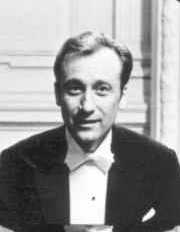 RS: Mmmm . . . I
must tell you little story. I know
Shostakovich personally, himself, because my father a few years was his
secretary. He knows me from my childhood, and we spent together
summertime, two months in Armenia. It was 1965, and we meet each
other day and night, eat together, and so on. Suddenly he
RS: Mmmm . . . I
must tell you little story. I know
Shostakovich personally, himself, because my father a few years was his
secretary. He knows me from my childhood, and we spent together
summertime, two months in Armenia. It was 1965, and we meet each
other day and night, eat together, and so on. Suddenly he 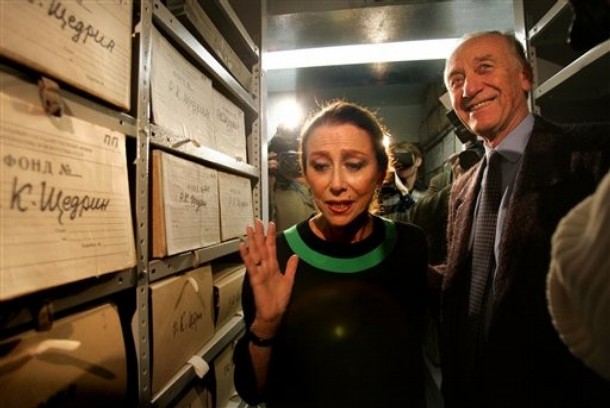 Russian ballerina Maya Plisetskaya and her husband, composer Rodion Shchedrin, stand next to boxes with their archives during a handover ceremony of them to the Russian State Literature and Art Archives in Moscow, Wednesday, November 8, 2006. (AP Photo/Dmitry Lovetsky) |
 RS: No. I am very
different. My body is the
same but sometimes I am in red coat, sometimes
I'm in blue shirt and so on. Different dresses, but body is of
course the
same. Sometimes you wake up and think, "How
beautiful is this life," and sometimes you wake up and think,
"How awful every life. Your mood is every
day changing many, many times. And for writing music,
also some periods you are so happy and everything is
fantastic around. And some times you are
absolutely in tragic mood and your hands write it
like diary! Music sometimes is just diary.
RS: No. I am very
different. My body is the
same but sometimes I am in red coat, sometimes
I'm in blue shirt and so on. Different dresses, but body is of
course the
same. Sometimes you wake up and think, "How
beautiful is this life," and sometimes you wake up and think,
"How awful every life. Your mood is every
day changing many, many times. And for writing music,
also some periods you are so happy and everything is
fantastic around. And some times you are
absolutely in tragic mood and your hands write it
like diary! Music sometimes is just diary. RS: [As if mystified by
the question] Where?
RS: [As if mystified by
the question] Where? RS: Mmm...
Personally, I am not optimistic about future of
my
country because now, absolutely everything is crushed - economic is
just kaput, just kaput. And also in our music life,
it's not good symptoms. Many, many people from
our best orchestra go to the West, try to run away from
the ship without a bottom. Ten years ago, 15
years ago, 20 years ago, in Russia it was one of
the greatest orchestras in the world, I think. But now our
orchestra lost discipline and they only think how possible to buy bread
and how possible to receive
coupons for sugar and how it will be possible to buy gasoline
for cars, because this is biggest problem - long, long,
long queue - maybe six hours you must take to just buy
gasoline. This is critical time, now, but the same time, of
course,
this is fantastic that you can speak all what you want!
This is really fantastic.
RS: Mmm...
Personally, I am not optimistic about future of
my
country because now, absolutely everything is crushed - economic is
just kaput, just kaput. And also in our music life,
it's not good symptoms. Many, many people from
our best orchestra go to the West, try to run away from
the ship without a bottom. Ten years ago, 15
years ago, 20 years ago, in Russia it was one of
the greatest orchestras in the world, I think. But now our
orchestra lost discipline and they only think how possible to buy bread
and how possible to receive
coupons for sugar and how it will be possible to buy gasoline
for cars, because this is biggest problem - long, long,
long queue - maybe six hours you must take to just buy
gasoline. This is critical time, now, but the same time, of
course,
this is fantastic that you can speak all what you want!
This is really fantastic.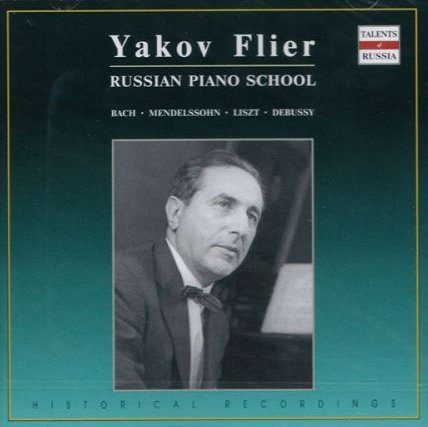 RS: Gilels play.
Gilels play, yes. My teacher, Yakov
Flier
(1912-1977) was, in my opinion, second only to Horowitz. He's not
so famous,
but he was genius. He was genius. He was second place, like
Boris Becker in the
tennis. [Both chuckle] [Becker had lost to Stefan Edberg at
Wimbledon in the summer of 1990] It's possible to say
that he was natural genius of piano. I never
see more beautiful fingers nor beautiful back.
He just like together with piano; it was one body. And he
play fantastic but he has a problem with finger which was not
flexible. Maybe 10 years he don't
play. [Flier did not give solo concerts from c. 1949 to c.
1959] And at the same time he was so lazy.
RS: Gilels play.
Gilels play, yes. My teacher, Yakov
Flier
(1912-1977) was, in my opinion, second only to Horowitz. He's not
so famous,
but he was genius. He was genius. He was second place, like
Boris Becker in the
tennis. [Both chuckle] [Becker had lost to Stefan Edberg at
Wimbledon in the summer of 1990] It's possible to say
that he was natural genius of piano. I never
see more beautiful fingers nor beautiful back.
He just like together with piano; it was one body. And he
play fantastic but he has a problem with finger which was not
flexible. Maybe 10 years he don't
play. [Flier did not give solo concerts from c. 1949 to c.
1959] And at the same time he was so lazy.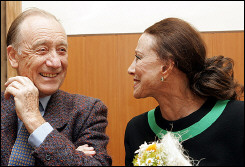 RS: Holiday,
yes. I
wrote it very quickly. It's a little story how it happened.
My wife, she's
ballerina. [Maya Plisetskaya (b. 1925)] It was
her idée fixe to dance
Carmen. I
refuse because I was too busy to write it. She ask
Shostakovich and at first he say, "Okay. I
will write it," but then he telephoned. For him, always
it's very difficult to say "No." He telephoned to say, [in a very
regretful tone of
voice] "Oh, no. Sorry, I refuse because I'm afraid is
impossible to be better than Bizet." And then I
tell to my wife, "You must make ballet using just Bizet's
music. Why special music? It's enough good." Then she
tell me,
"Something is wrong, because we want to make some accelerando and
morendo... Come to
rehearsal and see how it would be possible to
help us." And I come, and it was so beautiful! I just begin
write it in
the rehearsal hall because they
need different motivation for moving. Bizet's music is genius,
but it was against this motivation. [Chuckles] I just correct his
genius to work in ballet class. And then, like the
appetite, you eat and appetite comes to you
more, more, and more and...
RS: Holiday,
yes. I
wrote it very quickly. It's a little story how it happened.
My wife, she's
ballerina. [Maya Plisetskaya (b. 1925)] It was
her idée fixe to dance
Carmen. I
refuse because I was too busy to write it. She ask
Shostakovich and at first he say, "Okay. I
will write it," but then he telephoned. For him, always
it's very difficult to say "No." He telephoned to say, [in a very
regretful tone of
voice] "Oh, no. Sorry, I refuse because I'm afraid is
impossible to be better than Bizet." And then I
tell to my wife, "You must make ballet using just Bizet's
music. Why special music? It's enough good." Then she
tell me,
"Something is wrong, because we want to make some accelerando and
morendo... Come to
rehearsal and see how it would be possible to
help us." And I come, and it was so beautiful! I just begin
write it in
the rehearsal hall because they
need different motivation for moving. Bizet's music is genius,
but it was against this motivation. [Chuckles] I just correct his
genius to work in ballet class. And then, like the
appetite, you eat and appetite comes to you
more, more, and more and...  RS: Absolutely.
They sold my works. I am not host of
my
works! For example, Schirmer, in the United
States, they have monopoly of Soviet music and they think
that if I write something it must be only Schirmer! They
speak with me like with slave because they know nobody say, in Soviet
Union, "Why you so speak? This is our good
composer," and so on. Officially they
received 50 percent of all money of Shostakovich, of
Prokofiev, or every one of us. The monopoly is [taps hand on
table while speaking publisher's names] Schirmer in the United States,
Sikorski in Germany. I don't know every
one. In Japan, 50 percent
officially! They received money because they have
monopoly. This is a slaves! Now, for example, I
received commission from Steinway to write a piano
concerto, and Schirmer say, [shouts] "No!!! You
mustn't. It's our work!!" I say, "Why???" The
police said it's impossible speak directly. I
just tried to have contact directly with Steinway but it was impossible
to speak to them. I ask Schirmer, "In which month and which
year I must write it? How long this piece must be? Who
will perform? In which city?" And they answer to me - I
have this copy of this telex in my room! "We answer for
you. You give rights for this [strikes hand on table] work to
us." And signed it!!! Signed it!
RS: Absolutely.
They sold my works. I am not host of
my
works! For example, Schirmer, in the United
States, they have monopoly of Soviet music and they think
that if I write something it must be only Schirmer! They
speak with me like with slave because they know nobody say, in Soviet
Union, "Why you so speak? This is our good
composer," and so on. Officially they
received 50 percent of all money of Shostakovich, of
Prokofiev, or every one of us. The monopoly is [taps hand on
table while speaking publisher's names] Schirmer in the United States,
Sikorski in Germany. I don't know every
one. In Japan, 50 percent
officially! They received money because they have
monopoly. This is a slaves! Now, for example, I
received commission from Steinway to write a piano
concerto, and Schirmer say, [shouts] "No!!! You
mustn't. It's our work!!" I say, "Why???" The
police said it's impossible speak directly. I
just tried to have contact directly with Steinway but it was impossible
to speak to them. I ask Schirmer, "In which month and which
year I must write it? How long this piece must be? Who
will perform? In which city?" And they answer to me - I
have this copy of this telex in my room! "We answer for
you. You give rights for this [strikes hand on table] work to
us." And signed it!!! Signed it! BD: But you still have no
desire
to leave there for good!
BD: But you still have no
desire
to leave there for good!| Rodion
Shchedrin was born in 1932 in Moscow
into a musical family: his
father was a composer and a teacher of music theory. He studied
at the
Moscow Choral School and in 1955 he graduated from the Moscow
Conservatory where he studied composition and piano. His first
major
works were written in his early twenties. Never a member of the Communist Party, at the collapse of the Soviet regime Shchedrin was able to participate more fully in musical life world-wide. He now divides his time between Munich and Moscow. A virtuoso pianist, Shchedrin has often performed his own works, which include five concertos for piano and orchestra, sonatas and 24 preludes and fugues for piano. For over a decade he spent lot of his time and energies on heading the Russian Federation of the Union of Composers having succeeded its founder, Dmitri Shostakovich at the request of Shostakovich.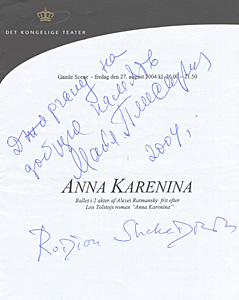 In his opera Dead Souls (after Gogol) and the ballet Anna Karenina (after Tolstoy), he introduced classics of Russian literature to musical theatre. All were performed at the Bolshoi Theatre, making Shchedrin the first composer to have had seven works staged there in its 200-year history. Shchedrin`s choral works, set to texts of Russian poets, are widely performed, as are his two symphonies and five concertos for orchestra. 
Since 1989 Shchedrin is member of the Berlin Academy of
Arts. |
This interview was recorded in Chicago on October 22,
1990. Portions were used (along with recordings) on WNIB in 1990,
1992
and 1997, and on WNUR in 2004 This transcription was made and
posted on this
website in 2008.
To see a full list (with links) of interviews which have been transcribed and posted on this website, click here.
Award - winning broadcaster Bruce Duffie was with WNIB, Classical 97 in Chicago from 1975 until its final moment as a classical station in February of 2001. His interviews have also appeared in various magazines and journals since 1980, and he now continues his broadcast series on WNUR-FM, as well as on Contemporary Classical Internet Radio.
You are invited to visit his website for more information about his work, including selected transcripts of other interviews, plus a full list of his guests. He would also like to call your attention to the photos and information about his grandfather, who was a pioneer in the automotive field more than a century ago. You may also send him E-Mail with comments, questions and suggestions.